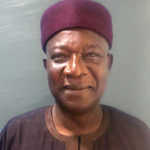Should we pursue training when souls are perishing?
Prof. Samuel Waje Kunhiyop


Missions is an urgent task. Millions of people still live in communities which have never heard the gospel. The consequences of an eternity without Christ are too upsetting to think about. And yet, missionaries delay going to the field or take study breaks from the field to get training.
What is the use of investing time and resources on cross-cultural training when the fate of souls is on the line? Should Christians study hermeneutics or systematic theology when so many have never heard the name of Jesus? Why pause to discuss books while war wages around us?
Abraham Lincoln, who abolished slavery in the United States, once said, “Give me six hours to chop down a tree and I will spend the first four sharpening the ax.” Similarly, solid cross-cultural and biblical training will result in missionaries who are more effective and avoid mistakes.
Dr. Samuel Kunhiyop is a scholar and follower of Christ with decades of service and leadership in African Christian academia. AfriGO interviewed him about the value of scholarly training, and the biblical precedent for both formal and informal training.
What are the benefits of formal training?
Many new churches in Africa don’t believe in formal training but that being “trained by the Spirit” is enough. But you see the heresies are being repeated. In my years of formal training following secondary school, I was exposed to many heresies that the church dealt with from the first up to the fifth centuries. This was excellent preparation for ministry today because people are repeating these heresies.
One example I have seen distorts the doctrine of the Trinity. It posits that God the Father was for the Old Testament, God the Son was for the New Testament, and God the Spirit is for our times now. The Trinity is thus grossly misunderstood. But this heresy was already debated and discarded in the fourth century.
Being a Christian is about more than knowing Jesus as personal Saviour. Even Paul, after his experience on the road to Damascus, was discipled by Ananias. He was a trained man who submitted to even more training.
If you don’t have formal training, you will repeat a lot of mistakes as well as risk creating syncretism – which we cannot allow. If we do, in 50 years from now we will have to send Christians to re-evangelize and that will be a very, very sad story.
Are there any drawbacks to formal training?
There is the temptation to become too legalistic – theology without the Spirit. We need both/and – both good theology and the Holy Spirit’s presence. When we have the right doctrine, we still depend on the Holy Spirit to do what is right.
Also, the accumulation of credentials for the sake of credentials can be a problem. In I Corinthians 12, Paul describes how the body is interrelated. The individualism of the West is shaping and even destroying the African people, even the church.
For example, if you go to school, you get your own grade, you get your own degree, you get your own PhD, and you become a big man. But the credential is not for the community. Traditionally in Africa, what I am is for the benefit of society. So, a potential drawback of formal training is that it rewards you as an individual and can remove you from being a benefit to your community.
Do you see formal training in the scriptures?
Yes, the Apostle Paul had the highest level of education possible in his day. He was versed in Greco-Roman culture and learning; no one could accuse Paul of not being prepared for ministry. He was prepared in both the letter and in Spirit.
2 Corinthians 3:6 says: “He has made us competent as ministers of a new covenant – not of the letter but of the Spirit; for the letter kills, but the Spirit gives life.” This was a philosophical distinction in the first century. But when we read all of scripture together, we cannot pit Spirit against letter. We are created with a mind.
Dr. Luke had formal training; he was a physician who authored the books of Luke and Acts. Titus, Apollos and Priscilla were all highly educated. In the Old Testament, we see that Elijah and Elisha were trained in the school for prophets (2 Kings 2, 4). Eli the priest trained young Samuel, and Moses received the highest education in the land of Egypt.
Someday I will give an account to God for all He has given me. God did not just give me a heart; He gave me a brain. He gave me a mind. So why can’t I use the mind? He also gave me a heart and feet to walk, so people will see. I have a lot in my head to pour out to my students, but I also have my heart and the way I walk.
How do you see informal training complement formal training?
When I studied for my master’s, my systematic theology professor chose four of his students – two Americans, one Chinese and one African, myself – to invite for breakfast every Monday from 6 to 7 am. So we had class with him and engaged our minds, but we also ate with him and engaged our stomachs and our hearts.
During one breakfast in 1986, he said to me, “Sam, do you think we need an African theology?” I could not answer him, but his question stayed in my mind. Twenty years later, I answered the question in my book, African Christian Theology. It is vital for every missionary and every trainer to engage with the mind, stomach and heart.
Today, not many of my students would say that because they had me for systematic theology, it changed their life. Rather, it is the personal things – when there is a death in their family, when they are struggling or out of money, etc. If my students don’t see me practicing my theology, then what is the use?
What cultural advantages might Africans have in mentoring and informal training?
The communal orientation of Africans can benefit discipleship and training, which is more organic, less dichotomized. In Africa, it is easier to combine theory and practice.
When you teach, students ask questions and tell you real stories of the issues. Africans don’t prefer abstract thinking – debate without practical relevance. You need both – theory plus practice, orthodoxy plus orthopraxy. When we get that right, we can produce mature and equipped missionaries.
Africans have a sense of ubuntu, or in East Africa, ujamaa, which means “I am because we are; and because we are, therefore I am.”
What if you cannot afford training?
First, know the scriptures well. Even if you cannot afford to go to seminary, there are many resources to do personal study, to train yourself.
Second, read! Do not limit yourself to the Bible, but read extensively. Study where you are going to serve – geography, history, culture, language. Be an informed person. Reading will supplement your formal education, no matter how little or much you have.
God has not only revealed himself in the 66 books of the Bible, but in nature, history and conscience. There are lots of books you can read to self-educate and to be an informed person. In today’s age, no one has an excuse for not being educated.
If you are engaged in a discussion, and you don’t even know what it is all about, others will look at you like you don’t know what you are doing. If you go to serve in ministry and you don’t know more than the Bible, you will probably be irrelevant.
In today’s age, you don’t have to travel overseas to study. But you have no excuse to be ignorant about many things. No one is going to ask you what your qualifications are. But if you speak as an informed person, people know. If you speak from ignorance, people know. So, you have no excuse to speak as an ignorant person.

Rev. Prof. Samuel Waje Kunhiyop is a scholar and Christ-follower with many years of experience in African Christian academia. He has served as academic dean, then provost, of Jos Evangelical Seminary (JETS) in Nigeria, head of the post-graduate school at the South Africa Theological Seminary, General Secretary of ECWA church in Nigeria, and more. He holds a doctorate in Systemic Theology and Ethics and is the author of African Christian Theology and African Christian Ethics. He is ordained with ECWA. He and his wife, Yelwa, reside in Jos, Nigeria. They have four children and 11 grandchildren.
 Expand Your Vision in 2026
Expand Your Vision in 2026